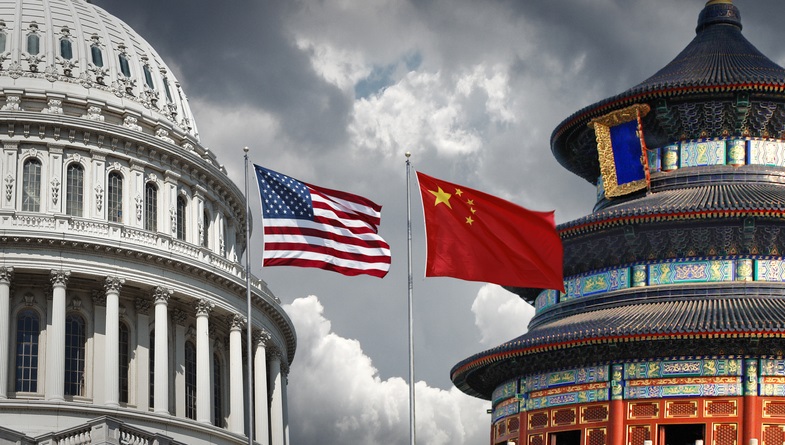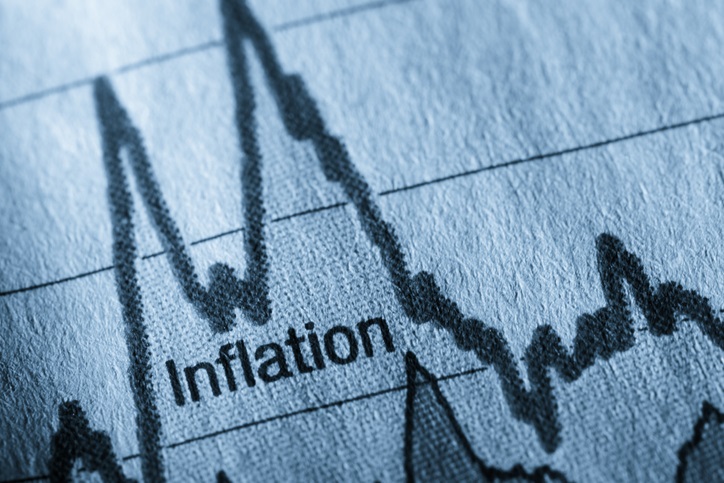Seven big risks keeping fund managers awake at night
Aside from the obvious coronavirus and Brexit concerns, there are other threats worrying fund managers.
11th August 2020 10:15
by Faith Glasgow from interactive investor
Aside from the obvious coronavirus and Brexit concerns, there are other threats worrying fund managers.

This year has a strange and ominous pincer-like feel to it for British investors, both professional and private. Behind and swirling around us through the summer is the medical, economic and social uncertainty of the coronavirus pandemic; ahead is the looming disruption of Britain’s exit from the European Union, and the increasing risk that there will be no trade deal in place to help ease the pain for UK businesses already crippled by lockdown.
It is easy to take the view that other threats to economic and investment prosperity are pretty trivial compared to these, certainly for British investors. But professional fund management involves being alert to less high-profile or more chronic risks as well as the ones that everyone’s talking about, and taking account of them in portfolio management.
So, we asked a cross-section of leading managers focused both on the British market and more internationally to tell us about the main macro-economic concerns disturbing their beauty sleep at the moment.
US-China political tensions

Political risk can take numerous forms, but is a major issue for Austin Forey, the highly experienced manager of JPMorgan Emerging Markets investment trust (LSE:JMG). “Politicians sometimes make decisions that increase investment risks. This can be especially true in the case of emerging markets – it often goes with the territory,” Forey comments.
“Political decisions can negatively impact equity value, sometimes for good reasons, sometimes for bad ones.”
One particular situation he cites is the potential fallout for emerging markets as the US and China tensions are ramped up over coronavirus, human rights violations and espionage, even though a trade pact signed in January remains in place. “I think the world is going to have to get accustomed to ongoing strategic rivalry between the US and China. It’s something I’m keeping a close eye on,” he adds.
A new cold war on the horizon
Anthony Willis, a macro research analyst for the BMO multi-asset team, is also nervous about the political posturing between the superpowers, particularly as the US presidential election approaches.
His concern is that the US administration seems to have “moved on well beyond trade, to see this more of an ideological battle”, with persistent recent references contrasting China to the “free world” from both Republicans and Democrats.
“The US election will be a divisive affair, but both sides will be united by their desire for ‘China-bashing’ to gain votes, and this will set the agenda for continued tensions – indeed potentially a new ‘cold war’ between the two superpowers over the years ahead,” he warns.
“This will have consequences not only for global trade but also for financial assets; it also poses a significant headwind to the forces of globalisation that have driven global growth over recent decades.”
Inflation and its distorting effect on the market

For Alasdair McKinnon, the global value-focused manager of the Scottish Investment Trust (LSE: SCIN), one of the biggest macro risks is that of inflation, as governments and central banks worldwide continue to print money. He points to the continuing surge in the price of gold, which in early August topped $2,000 an ounce for the first time.
- Gold at record high: pros, cons and the ETF options
- Ian Cowie: buying gold and high yield on the cheap
- Top 10 most popular investment trusts: July 2020
- ii Super 60 investments: Quality options for your portfolio, rigorously selected by our impartial experts
The obvious explanation is a boom in demand reflecting investor nervousness over continuing pandemic worries and tensions between the US and China. For McKinnon, however, gold’s biggest attraction is as an alternative to fiat currencies (such as sterling), which lose real value as inflation takes hold.
He explains:
“The scale and pace of money-printing by authorities has been unprecedented in peacetime. Policymakers are on a wartime footing as they move to stimulate the economy. The pandemic’s dampening effect on the economy is deflationary, but as those effects subside, inflation looks assured.”
One investment worry around inflation, he adds, is the way it can create distortions in markets.
“Profitless growth companies have been notable beneficiaries. You don’t have to look far to see egregious examples of assets being inflated well beyond a rational assessment of their current worth.”
Decline of sustainable growing dividend flows?
Among the biggest investment casualties of the past few months have been investors dependent on dividend income flows, as even stalwart equity income holdings – most recently BP (LSE:BP.) – have been obliged to cut, cancel or suspend shareholder payouts. Gervais Williams, who runs the LF Miton UK Smaller Companies fund, is concerned that companies are only now recognising how vulnerable they have become financially.
“The period of globalisation has been defined by decades of a mix of growth and ultra-low interest rates,” he explains.
“I worry that far too many corporates have just projected the past trends into the future without recognising that there has been a radical change in the political and economic agenda over recent years. In my view, too many of them are currently over-extended in numerous areas, including their balance-sheet debt. The pandemic has highlighted their vulnerability, which has led to numerous dividend cuts.”
Williams points out that long-term returns from a market depend primarily on the yield on investments and how that initial yield changes over time. Stable dividends compounding over time tend to produce a relatively substantial return, and if the dividend yield grows steadily then that return is enhanced.
“The trouble with the current picture is that dividends are being cut around the world, and new investors are buying at a much lower initial yield. So, I fear that the returns on mainstream stock markets could be much lower than in the last three decades, and potentially near zero, as they have been in Japan since 1989.”
Tax implications of economic rebuilding

Keith Ashworth-Lord, manager of the CFP SDL UK Buffetology fund, is concerned that the government’s efforts to rebuild its decimated coffers in the aftermath of lockdown could have a serious impact on the market value of well-known AIM companies that currently enjoy business property relief (BPR).
Provided these shares are held for at least two years and on the death of the investor, they are not subject to inheritance tax, so they are very popular as an estate planning tool.
“The Conservative manifesto ruled out increases to the big three taxes: income tax, national insurance and VAT. That closes off the heavy lifting options to restore the public finances after the disaster of lockdown. We have already seen capital gains tax put out for review and I fear the same for BPR,” says Ashworth-Lord.
Ashworth-Lord notes given that share prices are ultimately driven by supply and demand, this steady stream of demand has driven up the ratings of certain AIM shares higher than they otherwise might be. “Where these shares trade on lofty price/earnings multiples now, this would likely change precipitously if they lose their appeal,” he adds.
Footing the bill for economic support through the pandemic
Royal London’s veteran bond fund manager Eric Holt has been 40 years in the business, but still describes the present state of financial markets and economies as “truly extraordinary – in the true sense of the word – and outside any experience almost within living memory”.
One major issue concerning him is the question of how governments will recover the cost of economic support through the crisis. He points out that this challenge is all the more enormous because “real” interest rates have been negative for the past decade. That has created an increasingly divided society in which the rich have generally become richer because of asset price inflation and the benefits of globalisation, while the poor have become poorer.
As a bond investor, Holt is also concerned about the situation in regard to bond performance, which has been exceptionally strong as yields have fallen.
“UK government bonds have posted an index return of almost 10% so far this year, but now offer negative returns on bonds maturing in or before 2028, while 50-year bonds offer investors barely 0.5% per annum return. It feels like a lot of future value is now embedded in past returns, with a corresponding challenge on prospective returns,” he warns.
- Funds Fan: upsides to the dividend downturn and Scottish Mortgage
- Ian Cowie: why ‘doing good’ has paid off over the past 25 years
- ii Investment Outlook: Q2 2020
- Take control of your retirement planning with our award-winning, low-cost Self-Invested Personal Pension (SIPP)
Tackling the realities of sustainability
For Peter Michaelis, head of the Liontrust sustainable investment team, the events of the first half of this year have demonstrated all too clearly the disconnect between capital markets and social and environmental sustainability.
“Capital markets have to deliver widespread prosperity without destroying our society or environment,” Michaelis warns. He points out that the pandemic has also highlighted areas where economic efficiency must play second fiddle to social resilience, an obvious example being the need for protective equipment and spare capacity in the National Health Service.
“A sustainable society needs to provide opportunities for everyone to live purposeful, fulfilled lives; it also needs to operate within our planetary boundaries in a way that preserves and even enhances nature. One cannot happen without the other,” he adds.
Full performance can be found on the company or index summary page on the interactive investor website. Simply click on the company's or index name highlighted in the article.
These articles are provided for information purposes only. Occasionally, an opinion about whether to buy or sell a specific investment may be provided by third parties. The content is not intended to be a personal recommendation to buy or sell any financial instrument or product, or to adopt any investment strategy as it is not provided based on an assessment of your investing knowledge and experience, your financial situation or your investment objectives. The value of your investments, and the income derived from them, may go down as well as up. You may not get back all the money that you invest. The investments referred to in this article may not be suitable for all investors, and if in doubt, an investor should seek advice from a qualified investment adviser.
Full performance can be found on the company or index summary page on the interactive investor website. Simply click on the company's or index name highlighted in the article.